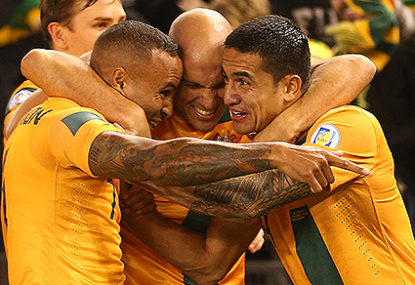The value of foreign-developed players: What Football Australia can learn from Morocco for Socceroos success
Morocco is not the only nation to find success with a large contingent of foreign-developed players - and the Socceroos can join that list.

Brazil are the red-hot favourites to win the World Cup, while Australia are ranked as the least likely nation in the entire tournament to make it to the knockout stage. Maths says so.
FiveThirtyEight is run by the recently-famous statistician Nate Silver, who correctly predicted Obama would win the US Election.
In conjunction with ESPN, the site and Silver himself have created an algorithm to predict the outcome of football’s grandest tournament.
The Soccer Power Index (SPI) has four central principles.
The variables are calculated and an SPI is given as a mark of 100. This mark is defined as “what percentage of the possible points a team would accumulate if it played a round-robin against every other national team”. With hours to go before the tournament begins, Brazil are favourites, with an SPI of 94.8 per cent. Australia’s 69.4 per cent is only higher than Algeria’s mark of 63.4 per cent.
But with Algeria in Group H – playing Belgium, Russia and South Korea – they are given an 18.9 per cent chance of advancing, compared to Australia’s 7.8 per cent chance of getting through the ‘group of death’ against Spain, the Netherlands and Chile.
“That’s unfortunate for Australia, which is the odd team out and has less chance than any other squad of advancing to the knockout stage, according to SPI,” wrote Silver.
We are rated a 7 per cent chance of beating Spain, 9 per cent against Chile and 15 per cent against the Netherlands. The likelihood of losing is above 60 per cent in all three matches.
Meanwhile, Brazil are considered all but certainties of progressing to the knockout stage of the tournament, SPI giving them a 99.4 per cent likelihood of progressing from Group A (Mexico, Cameroon and Croatia).
Furthermore, Brazil are a 45.2 per cent chance of winning the whole caboodle. Second favourites Argentina are given a 12.8 per cent chance, Germany are third at 10.9 per cent and Spain are fourth with 7.6.
Australia are given a 0.0 per cent chance of holding the Cup aloft, although it may serve as some comfort that Algeria, Honduras and Iran are given the same likelihood, and 22 of the 32 nations competing are rated a less than 1 per cent chance.
By SPI stats, Brazil are more likely to win the Cup than almost every other nation combined. Their recent form at home suggests the SPI may be spot on.
Brazil haven’t lost a match on home soil since 2002 and that was a friendly against Paraguay to celebrate Brazil’s victory at the 2002 World Cup. The last time they lost a game that actually mattered in Brazil was a 1975 match Copa América match to eventual champions Peru.
To put that in perspective, no member of Brazil’s playing squad was even born the last time they lost at home.
As the tournament progresses so will the SPI. You can stay up-to-date with its wild fluctuations as Australia breeze inflict three punishing victories by clicking here.
This will be the first World Cup where goal-line technology is used. Check out Joe’s story on the amazing seven-camera system at Techly.